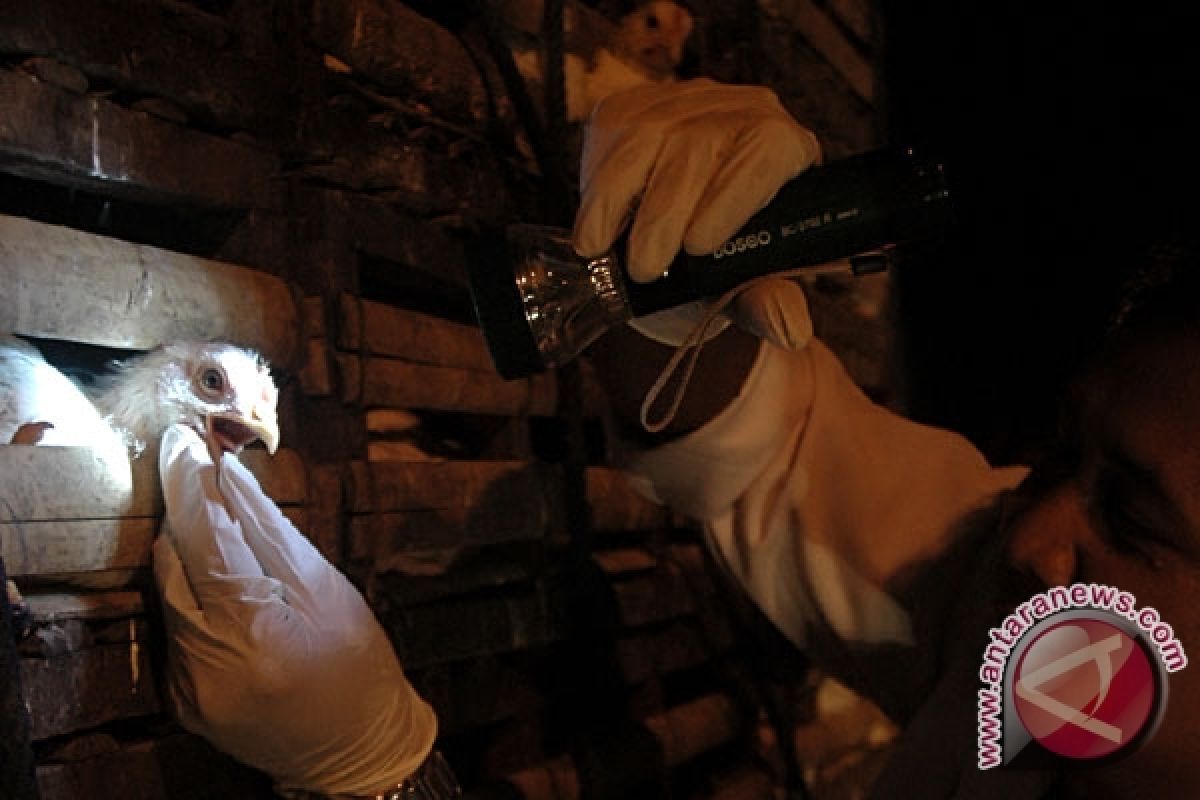The H5N1 avian influenza virus is endemic among others in Java, Sumatra, Bali, and Sulawesi with sporadic outbreaks reported from other areas.
In North Sulawesi the bird flu spread rapidly and should be tackled optimally as it is disturbing the local community, a local poultry breeder said.
"The spread of the H5N1 virus is already prevalent in a number of districts and towns, causing the sudden death of so many chickens there," North Sulawesi poultry breeders association spokesman Lexi Solang said in Manado over the weekend.
Lexi then called on the local government to immediately deal with it optimally.
He said that even around 56 chickens and ducks have been tested bird flu positive at Wineru village in North Minahasa district.
According to Lexi, the bird flu virus has also spread to the districts of Kota Kotamobagu, Bolaang Mongondow, and South Minahasa but it has yet to be treated optimally.
"The people there are very concerned about the impact of bird flu on the other sectors of economy in the province," Lexi said.
Meanwhile, North Sulawesi Vice Governor Djauhari Kansil has ordered related institutions such as animal husbandry office and health service office to tackle the spread of H5N1 virus, after a sudden dead of chickens in Modoinding sub-district in the past week.
In Lampung province, poultry at six of seven sub-districts at Pesawaran district have been affected by avian influenza virus.
"Since January 2011 eight bird flu positive cases have been reported from six of seven sub-districts in Pesawaran district, Lampung Province," local agriculture and animal husbandry office spokesman Aspiran Syateri said recently.
Aspiran said Pesawaran district was one of the endemic spread of bird flu on poultry in Lampung province.
Although Pesawaran was bird flu endemic, Aspiran said it happened to poultry only and not to the people so they did not have to worry about it.
To prevent H5N1 avian influenza virus from spreading, he called on the local people and the government to cooperate to monitor and report any incident immediately.
Even in Cilacap district, Central Java, a 36 years old resident of Karangsari village, identified by his initial as Smgn, was reported to have died of bird flu in the second week of April 2011.
Nurhasim, a family members of the victim said Smgn had high temperature and suffocation and finally died at Cilacap Public Hospital after having been treated for several days.
He said the family members were informed by the hospital official that Smgn died of avian influenza.
The prevalence of avian influenza in in various parts of Indonesia remains serious despite containment efforts undertaken by national authorities.
In the island resort of Bali, hundreds of chickens were reported to have died all in a sudden of H5N1 avian influenza virus at the districts of Jembrana and Bangli.
Jembrana health office spokesman Putu Suasta in the district town of Negara said on Sunday that a big number of chicken, owned by Made Susadi Susana in Pekutatan village, has died suddenly.
Following the sudden dead of the chickens, Putu said his party and the the officials of local animal husbandry office have had the living poultry at Susadi`s house and his neighbors depopulated.
"Even the dead and living poultry were incinerated to prevent H5N1 virus from spreading," Putu Suasta said.
Meanwhile, Bangli district`s livestock and fisheries department spokesman Ngurah Shamba admitted Bangli was very prone to bird flu because the region bordered with Klungkung district which has earlier been hit by the disease.
So far hundreds of chickens have died suddenly at the villages of Tembuku and Susut in Bangli district.
"There are four districts including Klungkung in Bali are hit by bird flu disease," Ngurah Shamba said.
According to a report from food and agriculture organization of the united nations (FAO), the human mortality rate from bird flu in Indonesia in 2008 was the highest.
Since the first outbreaks in 2003 avian influenza has spread rapidly across Java into Bali, Kalimantan and Sumatra.
In 2006 the virus spread further east infecting Papua and much of Sulawesi.
FAO said despite major control efforts, Indonesia had not succeeded in containing the spread of avian influenza in poultry.
Therefore, major human and financial resources, stronger political commitment and strengthened coordination between the central, province and district authorities are required to improve surveillance and control measures.
FAO is supporting the Indonesian authorities in most of these areas.
In addition, the agency has helped to train local teams of animal health professionals in participatory disease surveillance and response (PDS/R).
Other FAO activities include the provision of technical and policy advice to the Highly Pathogenic Avian Influenza (HPAI) Campaign Management Unit, support to communication strategies, the implementation of market chain studies and research activities.
Meanwhile, AFP quoted another FAO report as saying recently that it would take at least 10 years to eradicate the H5N1 bird flu virus, which has killed scores of humans, from poultry in the six countries including Indonesia where it is endemic.
The strain of the avian influenza virus was reported in 60 countries at its peak in 2006 but most had managed to stamp it out, the Food and Agriculture Organisation said in its report.
It said avian influenza remained "firmly entrenched" in Indonesia, Bangladesh, China, Egypt, India, and Vietnam, because of the nature of their production and market chains, and quality of veterinary services.
The H5N1 strain of avian influenza has killed around 320 people worldwide since 2003.
"Eliminating the highly pathogenic H5N1 avian influenza virus from poultry in the six countries where it remains endemic will take 10 or more years," the FAO said in its statement.
(T.O001/HAJM/F001)
Reporter: by Otniel Tamindael
Editor: Priyambodo RH
Copyright © ANTARA 2011












